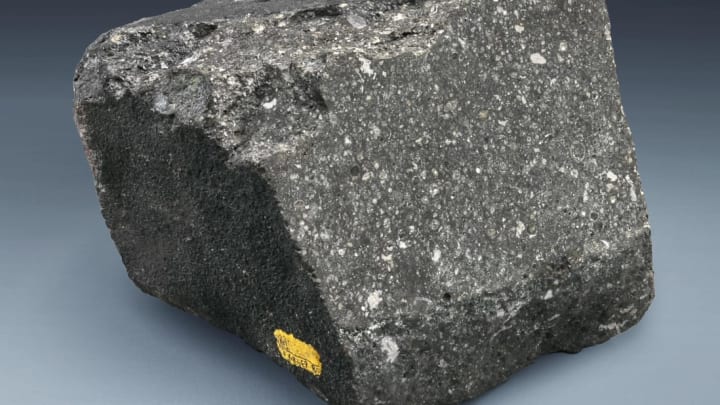Through the middle of next week, space lovers with cash to spare can purchase a 4.6 billion-year-old meteorite. As CNN reports, Christie’s auction house in New York is selling the rare rock as part of “Deep Impact: Martian, Lunar and Other Rare Meteorites,” an online auction that will run until Wednesday, May 10.
The ancient meteorite is a piece of the famous Allende meteorite, which exploded over the Mexican state of Chihuahua in 1969, scattering thousands of stones in its wake. Scientists collected the fragments, or purchased them from local residents, and discovered that they came from a very rare type of meteorite containing some of the planetary system’s oldest matter. Today, Allende is remembered as history’s most important—and studied—meteorite.
“There are two fractured surfaces and one freshly cut face,” the Christie's listing reads. “Fusion crust—the result of the meteorite’s burning descent through the atmosphere—covers most of the specimen’s surface area. Chondrules and CAI’s—the oldest substance mankind can touch—are richly evident.”
Bidding for the meteorite starts at $20,000. It’s a hefty price to pay for a piece of extraterrestrial history. But as Christie’s specialist James Hyslop explained to CNN, high-quality meteors like this one are very rare, so don't come around too often.
Meteorites are the fragments of comets, asteroids or meteoroids, which hurtle through the atmosphere to Earth. They often erode during their fiery journey, so it’s hard to find sizable ones with smooth, interesting shapes. The ones that are found typically wind up in private collections. (The Allende meteorite is from the National Autonomous University of Mexico’s collections.)
Age and scientific rarity also increase a meteorite’s value. In the Allende specimen’s case, “it’s 4.56 billion years old, a number so astonishingly large that it almost loses all meaning,” Hyslop said. “The way I've started to think about it is that the object is a third as old as time itself, which is really quite profound.”
[h/t CNN]
